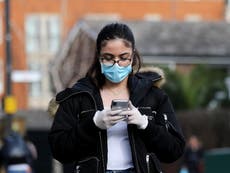As a doctor, I’m worried about a new epidemic – post-lockdown traumatic stress disorder
Lockdowns around the world are helping us to defeat the virus that causes Covid-19, but they may also unleash an even bigger public health crisis

Research tells us at least one in four of us could suffer from a form of post-traumatic stress disorder (PTSD) because of the pandemic. PTSD is most common in post-conflict settings. War brings with it fear of harm, loss of life, estrangement from family and friends, and lack of freedom in movement and activities; all conditions paralleled by what we have endured under lockdown.
What I call post-lockdown stress disorder (PLSD) could be a new expression of PTSD, and our health services must prepare us for it now.
Lockdowns around the world may help us defeat the virus, but they may also unleash an even bigger public health crisis. The physical dimension of the pandemic will soon be eclipsed by a mental health pandemic that will last longer, be more resistant to our interventions and perhaps even more deadly than Covid-19.
Most governments have focused their attention on protecting those most vulnerable to the lethal virus while assisting those facing the brunt of the lockdown’s economic destruction. Those most mentally vulnerable, however, have been less of a priority.
As a doctor, I know that even the most severe mental health patients can usually trace their downward spiral to a trigger event like bereavement, losing a job, a divorce, or experiencing abuse or neglect. For most people in the world right now, we are perhaps going through the biggest trigger of our lives and it is no surprise that we have already seen a soaring increase in levels of depression, anxiety, addiction and abuse.
Under normal circumstances, someone beginning to struggle with their mental health would be advised to build resilience by connecting with friends and family, going to the gym, volunteering or even taking a holiday. Much of this has become either illegal or almost impossible to do under lockdown. As a result, millions of otherwise mentally resilient individuals are silently drifting into a mental health pandemic, the impact of which cannot be understated.
Research from King’s College found that even a 10-day quarantine can lead to mental health issues lasting three years or longer. With many countries now approaching the third month of lockdown, Covid-19 continues to disrupt everyday life in immeasurable ways. Public services will continue to be stretched for months more and economists are warning us that the deepest and darkest global recession in over 300 years awaits us on the other side of this virus.
The last major recession led to over 10,000 extra suicides, and that recession was a purely economic crisis, unlike Covid-19, which superimposes a health crisis, an education crisis, and in many ways a social and political crisis too.
These effects are tragic if not traumatic for adults, and they will be destructive for children. In many parts of the world, schools have been closed for months, often with no end in sight. Experts are already warning of a “trauma gap”, which is likely to be exacerbated by a child suddenly not being able to see his or her classmates, friends and relatives. Their only support – parents or carers – are likely to be struggling with their own challenges.
Physical activity and interaction with others is essential to children's social, cognitive and emotional development. In some countries like Spain, children spent months unable to play in their own gardens, let alone public parks. In any other circumstances, keeping a child locked inside for months would be child abuse – and for good reason.
So, just as we buttress our healthcare infrastructure and bailout our economies, so too must we forge a new mental health strategy for everyone.
Essential to the effective management of PLSD will be non-traditional providers like charities and NGOs. I’ve lost count of how many times I’ve reassured a patient who has attempted suicide, telling them that the support is there but also knowing that that support is grossly inadequate.
It’s not a question of if, but rather when the waves of patients will emerge. Like PTSD, PLSD is not a condition that can be cured, but with the right mental health provision it can be managed. How well it will be managed, however, remains to be seen.
The best time to build this provision was years ago; the next best time is now.
Dr Bilal Hassam is an NHS returnee doctor and senior executive and Covid-19 lead at international humanitarian charity Penny Appeal





Join our commenting forum
Join thought-provoking conversations, follow other Independent readers and see their replies